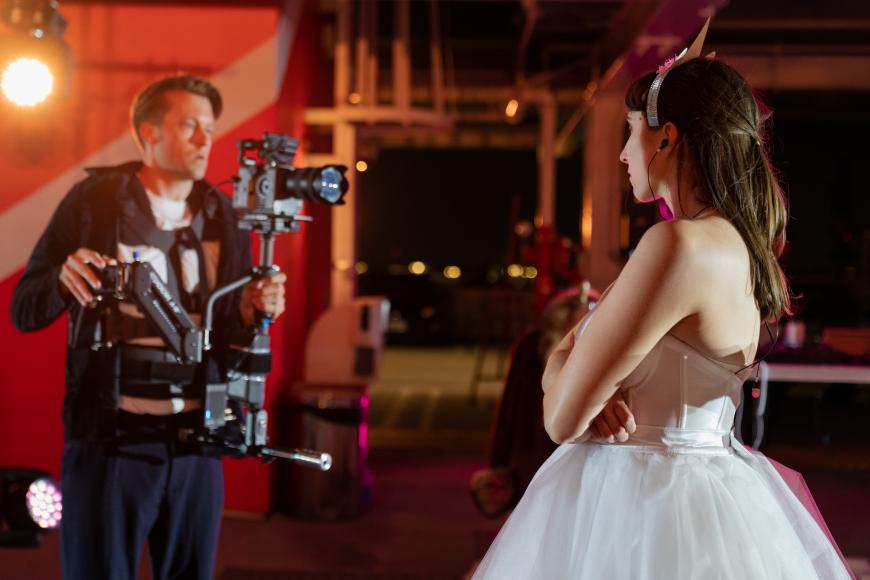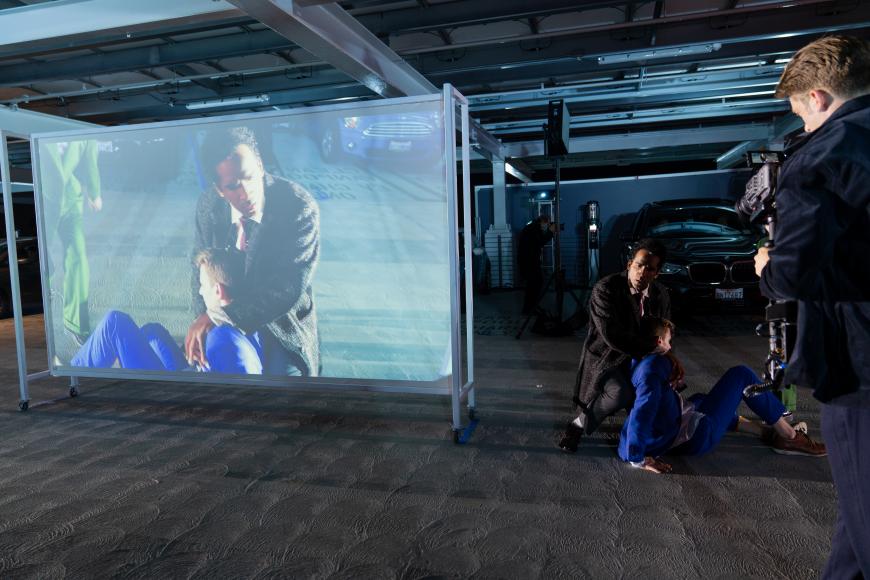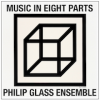
Every arts organization had a hard year — perhaps few harder than Long Beach Opera, which was going through leadership changes as COVID-19 ravaged the world. Outgoing Artistic Director Andreas Mitisek didn’t have a chance to say goodbye. Interim Artistic Advisor Yuval Sharon didn’t have a chance to say hello. The pandemic took care of all of that.
Yet this plucky company, always operating on a shoestring, always trying to stay on the cutting edge, pressed on. A James Darrah-directed indoor production of Philip Glass’s Les Enfants Terribles from Opera Omaha’s ONE Festival that Sharon put in place stubbornly stayed put on the spring schedule even as the lingering pandemic canceled two other productions. Sharon moved on to Michigan Opera Theatre, and Darrah inherited Mitisek’s job as artistic director.
Next, faced with continuing restrictions on live performances, Darrah quickly picked up on the LBO tradition of staging contemporary operas in strange places. Echoing Sharon’s feat at MOT of presenting Wagner’s Götterdämmerung in a parking garage, Darrah converted his Les Enfants Terribles into a drive-in production on top of a parking garage. That’s how Long Beach Opera reintroduced itself to the public Friday night (May 21) for the first time since the pandemic began.

To say it was a bizarre experience is to understate the obvious. The local reviewers in Omaha seemed baffled by the comparatively “conventional” original indoor production, and I don’t know what they would have made of this one. This was James Darrah unchained, running wild in a goulash of music, theater, dance, video, tech, and spectacle that also featured a production of Glass’s single-act dance opera somewhere in the mix. It was quite a hello, and he’ll probably be a good fit for a company that relishes going out on a limb.

Les Enfants Terribles is the last installment in a trilogy of Glass operas based on stories by Jean Cocteau (the others are Orphée and La Belle et la Bête, each in a different format) that appeared in quick succession in the mid-1990s. It’s a fairly grim tale about an orphaned brother and sister of indeterminate age, Elisabeth and Paul, who seem to live in their own private sphere. Elisabeth, or Lise, apparently is something of a controlling, childlike sadist, and she messes with the lives of Paul, his friend Gérard, and an androgynous model, Agathe.
Meanwhile, Glass is Glass; his minor-key broodings on familiar patterns have an all-purpose way of fitting into the mood of so many theatrical plots that he chooses to set — and this one is no exception. The best music in the 103-minute opera is front-loaded in the Overture, which really whets the appetite and sets the stage. But then it just rolls on and on uneventfully, refusing to change much until the denouement — such as it is — of the plot, where it gains some fire. It’s scored for just three pianos — in this case, three Yamaha digital pianos diligently played by Stephen Karr, Vicki Ray, and Sarah Gibson, and energetically conducted by Wild Up’s Christopher Rountree. The singing is in French, with occasional narration in English.
So much for the nuts and bolts of the opera. What will remain most indelibly in the memory are the logistics of Darrah’s production, which obfuscated more than it illuminated as it stole the show.
Our cars climbed to the top of the garage of Marketplace Long Beach in the Marina Pacifica area east of downtown and parked in a semicircle around or underneath the solar-panel-roofed interior. Recently loosened pandemic restrictions allowed people to set up lawn chairs next to their safely distanced cars; I chose to remain inside my vehicle. Several large screens were set up, but others had to remain under wraps for a while since fierce winds were blowing in from the harbor, forcing a delay of about 40 minutes from the scheduled “curtain” time. Even after being strapped down, the screen in front of my car wobbled ominously in the wind during the opera; it might have crashed into the car if it fell.

The cast posed, acted, mimed, and/or danced up and down the lanes separating the rows of cars, sometimes within inches of the hoods of the vehicles, as choreographer Chris Emile — taking over the original choreography from Gustavo Ramírez Sansano — used the entire floor. Darrah followed them around with a determined expression, wielding a video camera which, in turn, relayed the constantly moving, occasionally jittery images onto the screens in a single take as in the film Birdman. The spotlights were sometimes blinding from my vantage point, but what I was seeing cannot be taken for everyone’s experience since each car had a different view of what was going on. The sound coming through my car stereo was decent and balanced.
Soprano Anna Schubert, whose previous gig with Darrah in Ellen Reid’s prism got a lot of attention, is an expert at projecting fear, which was just as useful for the role of Elisabeth as it was in the other opera — and she caught the character’s childlike quality as well. Baritone Edward Nelson sang the role of Paul and also provided the pre-show ambient incidental music. Mezzo-soprano Sarah Beaty was Agathe, and tenor Orson Van Gay II was Gérard. Four mute dancers (Joe Davis, Shauna Davis, Samantha Mohr, and Maleek Washington) intermingled with the singers or spun off on their own.

The result of all this was an overloading of visual stimulation that didn’t really help to clarify the confusing structure of the plot, the vagueness of the libretto, and the relationship of the serene flow and poise of Glass’s score to what was going on. Not to mention the sheer daffy nature of the locale and the doleful circumstances that led us to it.
Darrah might argue that this was the point — to immerse the audience in a future-world, multimedia, multidisciplinary, sensory experience and not to worry about clarity and linear progression. OK, fine. Also, this production, which quickly sold out its three performances, was another sign that live concerts are well on the way to lifting the pall that fell upon our lives in March of 2020. We certainly can be grateful for that.
Still, I have to admit it was a long sit, even in the comfort of my car.




